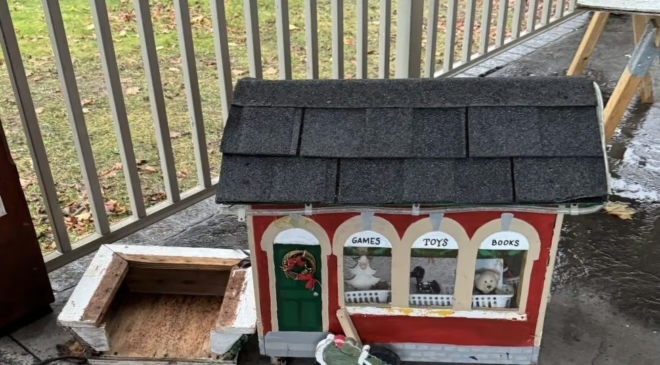After exceeding its annual province-set housing target for 2023, Woodstock is either on the cusp of reaching its 2024 goal, or well-short of the objective, depending on who’s keeping track.
Article content
After exceeding its annual province-set housing target for 2023, Woodstock is either on the cusp of reaching its 2024 goal, or well short of the objective, depending on who’s keeping track. Here are some things to know about the building faster fund, tracking the numbers and a snapshot of this year compared to last.
BACKGROUND OF BUILDING FASTER FUND AND WOODSTOCK
Advertisement 2
Story continues below
Article content
Announced in August 2023, the building faster fund is a three-year $1.2-billion initiative to encourage municipalities to reach mandated housing targets to help the province meet its goal of building 1.5 million new homes by 2031.
Municipalities that reach 80 per cent of their housing target are eligible to receive a payout from the fund.
On Nov. 14, Woodstock announced it was receiving nearly $2 million for exceeding its 2023 target of 403 homes set by Queen’s Park, with 475 homes.
The money must be spent by a specific deadline on projects permitted by the provincial government. At a Nov. 21 council meeting, Woodstock politicians voted to allocate the money to a homelessness centre.
2024 WOODSTOCK OUTLOOK
At a Nov. 21 meeting, Woodstock’s chief administrator David Creery said the city was well behind its 2024 target of 458 homes. So far, only 115 residential housing permits have been issued as of October.
“One hundred and fifteen won’t be the number, but it’s a low enough number to fairly confidently say we will not hit our target for 2024,” Creery said at the meeting.
Article content
Advertisement 3
Story continues below
Article content
However, despite the gap between housing permits and the city’s target, the province is reporting an optimistic outlook for Woodstock.
PROVINCIAL FIGURES
According to the provincial government’s housing supply tracker, Woodstock hasn’t fallen out of the running of this year’s race to 458 homes. In fact, the province reports the city has accomplished 97 per cent of its objective, with 443 homes so far this year.
If confirmed, the municipality stands to unlock more funding from the initiative.
The Ontario government’s tracker states it “relies on monthly housing starts” and additional rental unit data provided by Canada Mortgage and Housing Corp. (CMHC) as well as long-term care bed data from the Ministry of Long-Term Care.
CMHC senior officer David Harris stated by email it “depends on municipalities to provide building permits to inform their data collection,” and it works closely with municipalities “including Woodstock” to produce reliable data.
Harris said although the province uses CMHC housing starts data, it couldn’t answer questions about the province’s targets and program.
Advertisement 4
Story continues below
Article content
The Ontario government didn’t respond for comment before this story was published.

EXPLANATION
The disparity in the numbers could be explained by how the municipality tracks its figures versus the way in which the province reports its numbers.
“It’s hard to explain, I guess,” Creery said Monday. “What (Woodstock) tracks are permits; that’s what we know. It’s how many permits are going out the door, but what the government counts is not permits, it’s housing starts.”
The CMHC defines housing starts as “the beginning of construction on a building,” meaning usually when concrete has been poured “for the whole footing around” a structure or an equivalent stage, Harris said.
2023 DISCREPANCY
This wouldn’t be the first time there’s been a discrepancy between the province’s data and Woodstock’s figures, only this year the tables seem to have turned in Woodstock’s favour.
“We were scratching our head over the 2023 data,” Creery said. “It grossly underreported what we believed to be our performance, now, it’s kind of flip-flopped.”
In February, when statistics were released pertaining to 2023’s home construction, the government reported Woodstock had only completed 120 of its 403 provincial target, whereas the municipality reported it had issued 370 permits.
Advertisement 5
Story continues below
Article content
“Units and housing starts will not always align due to the delay between when a housing unit is permitted versus when construction begins and it is included in our starts and completions survey,” Harris said.
The figures were later revised to reflect Woodstock’s starts of 475 homes.
DOWNTURN?
Creery pointed to a downturn in housing demand in 2024 as a reason for Woodstock issuing fewer permits, noting “a lot of municipalities aren’t doing very well.”
For example, the province’s tracker is reporting London has reached 2,508 of its 3,917 target for 2024 as of October.
Harris confirmed housing starts are down provincewide from 74,417 in October 2023 to 61,603 October 2024.
The CMHC cited “high financing costs, lower asking rents and softening re-sale markets in some centres” among factors for lower housing starts in the province in 2024.
The Local Journalism Initiative is funded by the Government of Canada
Recommended from Editorial
Article content








Comments